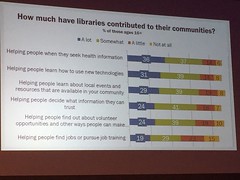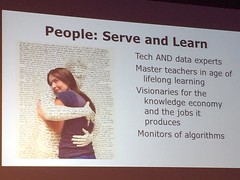Note that next year's conference will be March 21-23, 2017 at the Washington Hilton.
Lee Rainie is the director of the Pew Internet Project.
Lee Rainie is the director of the Pew Internet Project.
Pew Internet Project describes itself as a "fact-tank". They are not allowed to have an agenda that drives their work nor to try to drive policy changes.
"tweckle" - heckling a speaker on Twitter. Rainie jokingly asks not to be tweckled!
Pew findings at http://libraries.pewinternet.org
Findings from previous research:
- People still think libraries are very important, especially for communities.
- In an era of systemic declines in trust in major institutions, people like and trust libraries.
- People think libraries level of the playing field for those without vast resources.
- People think libraries provide
revives that a that'd to bet elsewhere.(Yikes, I don't know what this is supposed to be!) - People believe libraries have rebranded themselves as tech hubs.
Four things people like about libraries:
- "Free" books
- Getting questions answered
- A place of solitude
- Access to computers
New data on library usage:
- Physical interactions with libraries is going down a little bit.
- 2015 - 44% of those 16 or older. Down 9% since 2012.
- Use of library web sites is up to 31% for the same population in 2015.
People who use libraries are more well off than those who do not. More families and mothers of young children. There is not a racial or ethnic difference among library users. No difference in size of community.
Senior citizens are a little less likely to use a library than those under 65.
If your local library close, what would the impact be on you? People felt that it would have a major impact on the community. People are less likely to say that it would have a major impact on them (33% no impact).
 How much have I tries contributed to their communities? 36% said "a lot" in terms of providing health related information. 31% a lot in helping people learn new technologies. Helping people decide what information they can trust, 24% said the library contributed a lot to that. 19% believe the library has contributed a lot to helping people find jobs or pursue job training.
How much have I tries contributed to their communities? 36% said "a lot" in terms of providing health related information. 31% a lot in helping people learn new technologies. Helping people decide what information they can trust, 24% said the library contributed a lot to that. 19% believe the library has contributed a lot to helping people find jobs or pursue job training.
The clear public mandate: do something for education... Large major see libraries as part of the education ecosystem.
Should libraries move some print books and stacks out of the public locations to free up more space for things such as tech centers, reading rooms, meeting rooms, and cultural events? Definitely not - 36% in 2012, 25% in 2015. In 2015, maybe=40%; definitely=30%. The answers were consistent across various audiences in 2015. The public is giving libraries to be more flexible.
Should libraries coordinate more closely with local schools in providing resources to kids? Definitely=85%; maybe=11%; no=2%. People believe libraries can help struggling schools.
Should libraries offer free early literacy programs to help young children prepare for schools? Definitely=85%; maybe=12%; no=2%. This is both literacy in the traditional sense, but also in terms of digital literacy - critical thinking, privacy, etc.
Should libraries offer programs to teach people, including kids and senior citizens, how to use digital tools ... Yes!
Learning as identity - do you think of yourself as life long learner? 73% over 18 years old said yes. I like to gather as much information as I can when I come across something that I am not familiar with, 61%. I find myself looking for new opportunities to grow as a person, 57%. ("Describes me very well.")
74% of all adults are personal enrichment learners. 58% read publications related to personal interest. 35% attended meeting where Lerner new info such as book club or art club. 25% have taken a course and 16% have taken an online course.
The motives of personal learners:
- Make life more information, 80%
- Learn something go that would allow me to help others, 64%
- Extra time on my hands, 60%
- Want to turn a hobby into extra income, 36%
- Learn something to help with my children or other kids school work, 33%
63% of the employed are work-related learners:
- To maintain or improve my job skills, 55%
- For a license or certification, 36%
- To help get. Arise or promotion, 24%
- To get a job, 13%
- Because I'm worried about losing my job, 7%
Peoples learning activities are tied to a variety of factors:
- Level of education
- Household income
- Race and ethnicity
- Technology assets
- Personal outlook
- Job categories
How well, if at all, do your local libraries serve the learning and educations need of your local community? Wee/pretty well 60+%. Serve education needs, 60+% week/pretty well.
62% know that public libraries offer ebooks for borrowing. 41% know that libraries online career or job-related resources. 26% know libraries offer online GED or high school equivalency classes. 24% said their libraries offer programs to start need businesses. 22% offer online program that certify people that have mastered new skills. Libraries may be providing these much more than people realize. Rainie noted that John Bertot's data would provide more insight into this.
Should libraries offer programs about protecting privacy? 76% said definitely yes. 18% said maybe.
Should libraries provide more compatibles spaces for readings etc.? 64% said definitely yes.
- Tech and data experts - people are anxious to turn to librarians to help with technology and data concerns.
- Master teachers in age of lifelong learning - people recognize that we continuously learn and that we can help them learn.
- Visionaries for the knowledge economy and the jobs it produces - we are the rock stars of the knowledge economy. Can we become forecasters? Can we share what we are learning? The history says that life, jobs, etc. is getting better. Others are so sure. How will machines impact our future? Will more jobs be created? Don't know.
- Pew asked people a question about this. People felt that the jobs outlook is bad for others, but good for them personally. I'm okay, but everyone else is screwed.
- Monitors of algorithms - mathematical tools are doing the analysis. Are they biased? What is behind the algorithms is not well disclosed. Can librarians ask for transparency and accountability?
Place: Reconfigured and Repurposed (the library as place):
- Embrace the Internet of things
- Become the "first place" to meet
- Fill in "market holes" or niches
- Test beds - maker masters - ~45% believe that libraries should be purchasing equipment and doing this.
- Community information stewards - journalists are not covering civic information as they did in the past. Can the library be the place where people can figure out what's going on with their community? Create dashboards.
Platform: Community Resources (libraries as platform):
- Trusted, top of the mind institution for learning
- Advocates for free and open
- Advocates for closing digital divides
- Privacy watchdogs.
Finally, Rainie encouraged us to "be not afraid."
This post was updated on March 11, 2016.
This post was updated on March 11, 2016.

No comments:
Post a Comment